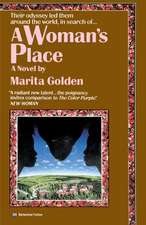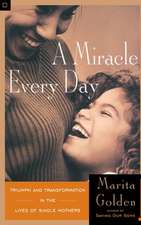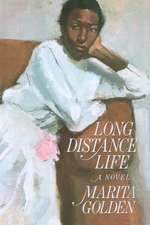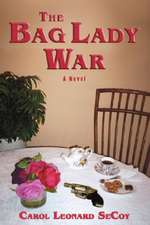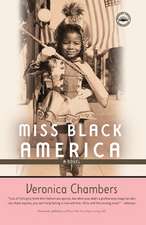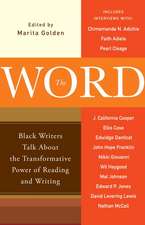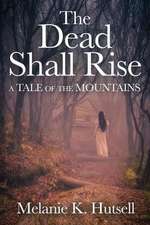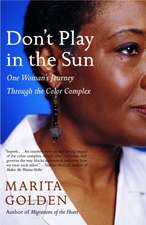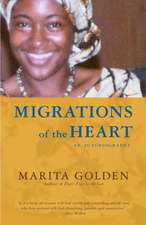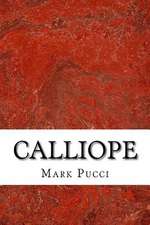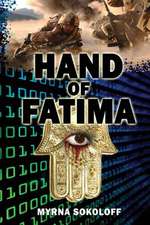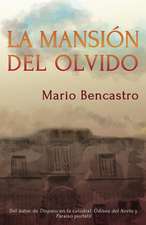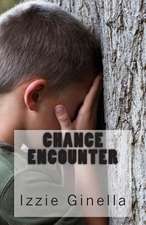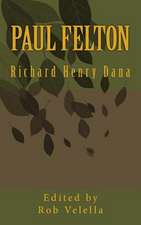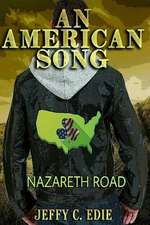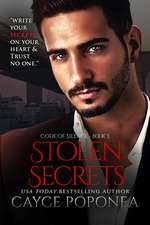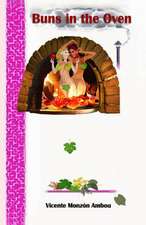After
Autor Marita Goldenen Limba Engleză Paperback – 30 iun 2007
Vezi toate premiile Carte premiată
For twelve years Carson Blake inhabited a world of his own creation. Scorned by the father who was incapable of showing him affection and nearly consumed by the mean streets of Prince George’s County, Maryland, Carson did what no one else could: he saved himself.
After joining the police force and building a family with his wife, Bunny, Carson is finally in control of his life in the enclave where African American wealth and privilege shares the same zip code with black American crime and tragedy. Both Carson and his wife have great careers and three beautiful children: Roslyn, Roseanne, and Juwan. Carson is a devoted father, determined not to be the father that Jimmy Blake was to him. But while Juwan’s astounding artistic talent is his father’s pride, the boy’s close relationship with classmate Will conjures up emotions and questions in Carson that threaten to spill over and poison the entire Blake family.
And then, one night in March, nearing the end of a routine shift, Carson stops a young black man for speeding. He orders Paul Houston to exit the car and drop to his knees. But when Houston retrieves something from his waistband and turns to face Carson, three shots are fired, one man loses his life and two families are wrenched from everything that came before and hurled into the haunting future of everything that will come after. When it is revealed that Paul, a son of educators and a teacher in Southeast D.C., was only holding a cell phone, Carson’s carefully woven world begins to unravel.
After is a penetrating work of discovery for a man whose life careens more than once off the edge of disaster. Golden’s astounding prose will stay with you long after you’ve turned the last page.
Preț: 105.63 lei
Nou
Puncte Express: 158
Preț estimativ în valută:
20.22€ • 21.97$ • 16.99£
20.22€ • 21.97$ • 16.99£
Carte tipărită la comandă
Livrare economică 21 aprilie-05 mai
Preluare comenzi: 021 569.72.76
Specificații
ISBN-13: 9780767917780
ISBN-10: 0767917782
Pagini: 237
Dimensiuni: 147 x 207 x 15 mm
Greutate: 0.21 kg
Editura: Harlem Moon
ISBN-10: 0767917782
Pagini: 237
Dimensiuni: 147 x 207 x 15 mm
Greutate: 0.21 kg
Editura: Harlem Moon
Extras
1
The bullets discharge from the muzzle of Officer Carson Blake’s sixteen-round Beretta with the tinny, explosive popping sound of a toy gun. He will not remember exactly how many shots he fires so wildly. Fires with pure intent. Fires, he is sure, to save his life. In the first seconds after the shattering sound of the bullets subsides, he would say, if asked right then, that he had fired every bullet in his gun. Never before has his gun been so large. Never before has it weighed so much. He’s dizzy and breathless. His heart beats so fast, he can’t believe he is still standing.
When he shoots the man, everything, all of it, unfolds as if in slow motion. He wants to look away. He dares not turn his gaze. The first bullet boring through the man’s thick neck riddled with razor bumps, the force twisting his head to the side, as though he is looking with those astonished, horribly open, not yet dead eyes to see where the bullet comes from. The second bullet piercing the skin of the black leather jacket, lodging in the flesh of his shoulder. The third bullet, fired at his groin, bringing him to his knees and then onto his face, sprawled flat out on the parking lot forty feet from the entrance to the Chinese restaurant The House of Chang.
Carson stands staring at the man on the pavement, his body a bloody heap illuminated by the fluorescence of the mall parking lot lights, and sees the cell phone a few feet from the man’s hand, and he prays for the ground beneath his feet to shift in a cataclysmic rumble and swallow him whole. A cell phone, he thinks, unbelieving. A cell phone. Not a gun. He hurls a howl, deep and guttural, into the night. Sinking to his knees, he touches the man, turns him over onto his back, sees the bulbous, bloody wound in his neck, smells the sharp odor of his sodden groin, desperate now to find, to feel, a pulse. There is none. There is only the cell phone. Looking up in desperation, Carson sees a sky unfamiliar and frightening, in which he can fathom not a single star, a vastness that makes him wish for wings.
Carson tries to stand but cannot, and he crawls a few feet away and vomits. When there is no more sickness to spill from his gut, he wipes his mouth and shouts at the dead man, through trembling lips stained with a blistering splash of tears, “What the fuck were you doing? Why didn’t you just do what I said?”
T here is nothing on this night that hints at disaster. After twelve years on the force, Carson can tell when a shift will be hell on wheels. On those shifts, the dispatcher begins reciting an address and an “incident” (car crash, domestic disturbance, robbery, brawl, accident, murder) even before Carson is belted behind the wheel. Then there are the calm, quiet shifts when hour after hour he’s numb with boredom, cruising the nine square miles of his police service area, and after a couple of hours he begins looking for a safe place to park and take a nap.
But he can’t get bored. Because bored he won’t see the obvi-ous–the missing tags on a beat-up hoopty driven by a carload of young punks looking for trouble and determined to find it. But this night he is bored by 9:45, when he walks into a 7-Eleven near the litter-filled streets of a housing project known as “The Jungle” to buy coffee and a doughnut. Carson ignores the group of high school—age boys hanging out in front of the store at almost ten o’clock on a school night, rapping, jonin’, joking, lying. Matches waiting to be struck. Don’t they have homes? Carson wonders for the thousandth time, then recalls what he has seen in some of the homes these boys live in–rats, roaches, three kids sleeping on the living room floor, toddlers playing near stacks of cellophane-wrapped crack cocaine, no heat in the winter, stifling ovenlike apartments in the summer, overworked mamas, long-gone daddies. Those homes make the parking lot of 7-Eleven seem a step up in the world.
Still, why the hell were they standing outside to talk? Just hangin’. He’d read somewhere that this was street corner culture, an integral part of the Black experience. Some urban ritual. But this is Prince George’s County. No inner-city street corners here, like in nearby D.C. But niggahs, he thinks sullenly, can turn anyplace into a ghetto.
Nearly all the arrests he’s made, all his stops, involve boys like the ones he barely looks at as he passes by, feeling them grit on him with a steely stare because he’s a police officer. To them he’s a cop and he is, in their eyes, the enemy. He’s fed up with arresting young Black males–aimless, directionless, often involved in nonviolent crimes that set the stage for all the shit that hits the fan in their young lives. Just last week he was called to the scene of a shooting and saw a kid no more than seventeen, dressed in spanking new jeans, two-hundred-dollar Air Jordans, and a Phat Farm sweatshirt, loaded into the Emergency Services vehicle, dead. Shot in the back while standing outside a Popeyes, from the passenger side of a Crown Vic that careened past the spot where he stood munching on a spicy chicken breast and a biscuit while talking to his baby’s mama. The car didn’t even slow down to make the hit. As Carson watched the EMS vehicle drive away, he wondered how many hits the kid had made. Revenge, payback, and a brutal, bloody synchronicity ruled the lives of too many of the young men he arrested. He saw precious few truly innocent victims. Predators, that’s what he calls them, kids like that fourteen-year-old who walked into a convenience store in Oxon Hill and tried to rob it at 5 a.m. and ended up stabbing the Korean owner to death. What the fuck? Carson sometimes wonders. God damn, my people, my people, envisioning the future of the race in every act and every choice these young men make. He’s tried to talk to them, standing in groups like these or in handcuffs in the backseat of his cruiser, but he might as well be speaking Mandarin.
So yeah, he is tough, and he is hard on their Black asses. There but for the grace of God ...He has a son who in his worst nightmares turns into a wannabe thug giving these young bloods a run for their money. None of it makes sense. On more than one shift he’s arrested suburban Black boys from Leave It to Beaver homes, hungering to be criminals, proving their street smarts by being stupid enough to land in jail. He’s arrested boys with a plasma TV in their basement and their father’s BMW SUV and mom’s Lexus and their Honda parked in the garage. He’d been a young punk once too, angry, feasting on his own sense of deserved and superfluous rage at a world he couldn’t control and that he was sure would never give him room. But bored, this night, Carson doesn’t even say a word, just figures his presence, the patrol car, the weapon the boys know is in his holster, will do all the talking for him. He swaggers past the cluster of boys, all of them dressed in baggy jeans and oversize shirts, blue bandannas tied around their cornrowed heads. Carson strides a bit more forcefully than usual, preening to let them know that the convenience store is his turf, not theirs.
Everybody thinks it’s postal workers who are the major victims of workplace crime. It’s really the immigrants and teenagers and retired giving-my-own-business-a-try salesclerks behind the counters of convenience stores who are the most vulnerable workers in America. It’s always open season on them. Every damn day of the week is a “good day to die” for one of them somewhere in the land of the free. By just standing at the magazine rack, thumbing through copies of Hustler or Newsweek, or shooting the breeze for a half hour with whoever is working, Carson can stop a crime.
Because Carson doesn’t tell the boys to move on, to go home, they continue to stand outside, as loud and boisterous as if they were playing video games and sipping forties in their living room instead of standing in a public place. He could get them for congregating beneath the No Loitering sign, but he doesn’t.
He and Eric used to debate all the time which was worse, more dangerous: the boredom that makes you lazy, careless, stupid, or the nights of pure adrenaline, responding to priority calls back to back. And don’t let it be another officer down. But that’s why Carson is out here. Why he’s a cop. He loves the rush. The risk. Everything on the line. The pressure. The chance to change some-body’s fate, save a life, because he got there in time to catch the burglar, prevent some jerk from giving his wife an ass-whooping and turning her into a corpse. Or maybe he stops a killer on the side of Route 450, pulls him over because the knucklehead is driving a car with broken taillights, expired plates, and when he runs his license through the computer he discovers this is a live one, the kind of scum they build prisons for, and when he searches the car he finds a weapon. And not just any weapon, but one that’s loaded and has been used in a murder.
Still, 95 percent boredom. That’s Carson’s average week. Sometimes his average month. This isn’t nearby Washington, where there are weeks when somebody gets killed every night. This is the ’burbs. But still.
On this March night, a night when it is not quite spring, when it’s a chilly forty degrees, there’s this flat-out wide-faced moon in the sky. A moon so big and awesome it’s like a gigantic neon eye or face. A full moon, bursting the seams of the heavens. Milky and liquid and trembling. It’s not white but some strange kind of orangey yellow, like no moon Carson can ever recall seeing in the sky. The full moon. That’s the only odd thing. The only unexpected thing on this night, when Carson has given a couple of speeding tickets and the radio has been mostly silent.
Carson isn’t superstitious. Not like Steve, who keeps a rabbit’s foot in his wallet, or Eric, who recited the Twenty-third Psalm, closed his eyes and said it silently in the squad car before he pulled out of the station lot. “The Lord is my shepherd, I shall not want.” No, Carson figures all that just attracts catastrophe. Why depend on luck instead of yourself ? Why close your eyes to pray when what you fear could be closing in? So that moon, which he will tell Bunny about if she’s awake when he gets home, that’s the only strange thing so far this night. His patrol service area includes everything–the area around Martin Luther King Boulevard, the weathered houses and streets of the working-class neighborhood near the FedEx Field football stadium, and the moneyed community called Heaven’s Gate. It’s mostly the area around King Boulevard that keeps him busy with burglaries, robberies, drug traffic. But this night, one hour before his shift ends at midnight, Carson congratulates himself. It’s been quiet. Maybe too quiet, even for a weeknight. But there is nothing in the quiet that makes him think that the worst will be saved for the last moments of his shift.
Half an hour after leaving the 7-Eleven, he’s making one last swing around Enterprise and Lottsford roads, past million-dollar houses and the estates behind the barriers of gated communities. He isn’t doing that well, but with his salary and the $25-an-hour part-time security work he performs, and Bunny’s recent raise, they are a $150,000 household and he lives fifteen minutes away. He doesn’t live in Heaven’s Gate, the community he’s just passed that has been written up in magazines and even the New York Times as symbolic of Black suburban progress. He lives in Paradise Glen, and Carson is just as happy in paradise as he figures he’d be in heaven. He knows police officers who drive Jaguars and Benzes, have high-six-figure salaries, and are in debt up to their ears, cops addicted to doing nothing but working and making money the way some are in the grip of booze and women.
Carson spots another squad car parked in the lot of Kingsford Elementary School. When he pulls up beside the cruiser, he immediately sees that it’s Wyatt Jordan. The fluorescence of the parking lot lights glows on his massive shaved head. Carson parks beside Wyatt and gets out. He stretches his arms and shoulders as he walks around to the other side of his cruiser. Jordan’s thick, rumbling laughter is the only sound besides the occasional car cruising past on Enterprise Road. The conversation, which Carson hears through Jordan’s half-open window, has the sound of an easy, illicit dialogue, and he figures Jordan is having phone sex. There are all kinds of rumors about Jordan, that he’s hooked on Internet porn sites, and Carson knows he’s a player, has seen him in action. He’s been busted more than once for stopping by his girlfriend’s house for a quickie while on duty, and his wife waited for him to get off his shift one evening and jumped out of her Volkswagen and charged after him with a baseball bat.
“Drama Queen” is Carson’s nickname for Jordan. He’s got no respect for cops who let their lives become a public mess. He knows Jordan from a distance, and he’s fine with that. But hell, he can shoot the breeze for a minute. Jordan ends the call and snaps the cell phone shut.
“Am I interrupting something?” Carson asks, leaning on the side of the cruiser, letting a wide, wily grin spread over his face.
Jordan extends his beefy arm out the car window, a raucous laugh rumbling up from his chest. The two men slap palms and shake hands. “Come on, Blake, ease up–I know what you heard, and it’s all true.”
“All the hardheads must be working a new shift or stayed home instead of risking running into you,” Carson says.
“That’s what it looks like. Only real action I had tonight was a domestic disturbance call over near Bowie High School. By the time I got there, the dude didn’t wanna press charges.”
“Say what?” Carson laughs at the thought of where this story is headed.
“No joke.” Jordan opens the door of his cruiser and lifts his bulk out, leaning on the side of the car. He’s six-seven, two-seventy-five, and solid as a rock.
From the Hardcover edition.
The bullets discharge from the muzzle of Officer Carson Blake’s sixteen-round Beretta with the tinny, explosive popping sound of a toy gun. He will not remember exactly how many shots he fires so wildly. Fires with pure intent. Fires, he is sure, to save his life. In the first seconds after the shattering sound of the bullets subsides, he would say, if asked right then, that he had fired every bullet in his gun. Never before has his gun been so large. Never before has it weighed so much. He’s dizzy and breathless. His heart beats so fast, he can’t believe he is still standing.
When he shoots the man, everything, all of it, unfolds as if in slow motion. He wants to look away. He dares not turn his gaze. The first bullet boring through the man’s thick neck riddled with razor bumps, the force twisting his head to the side, as though he is looking with those astonished, horribly open, not yet dead eyes to see where the bullet comes from. The second bullet piercing the skin of the black leather jacket, lodging in the flesh of his shoulder. The third bullet, fired at his groin, bringing him to his knees and then onto his face, sprawled flat out on the parking lot forty feet from the entrance to the Chinese restaurant The House of Chang.
Carson stands staring at the man on the pavement, his body a bloody heap illuminated by the fluorescence of the mall parking lot lights, and sees the cell phone a few feet from the man’s hand, and he prays for the ground beneath his feet to shift in a cataclysmic rumble and swallow him whole. A cell phone, he thinks, unbelieving. A cell phone. Not a gun. He hurls a howl, deep and guttural, into the night. Sinking to his knees, he touches the man, turns him over onto his back, sees the bulbous, bloody wound in his neck, smells the sharp odor of his sodden groin, desperate now to find, to feel, a pulse. There is none. There is only the cell phone. Looking up in desperation, Carson sees a sky unfamiliar and frightening, in which he can fathom not a single star, a vastness that makes him wish for wings.
Carson tries to stand but cannot, and he crawls a few feet away and vomits. When there is no more sickness to spill from his gut, he wipes his mouth and shouts at the dead man, through trembling lips stained with a blistering splash of tears, “What the fuck were you doing? Why didn’t you just do what I said?”
T here is nothing on this night that hints at disaster. After twelve years on the force, Carson can tell when a shift will be hell on wheels. On those shifts, the dispatcher begins reciting an address and an “incident” (car crash, domestic disturbance, robbery, brawl, accident, murder) even before Carson is belted behind the wheel. Then there are the calm, quiet shifts when hour after hour he’s numb with boredom, cruising the nine square miles of his police service area, and after a couple of hours he begins looking for a safe place to park and take a nap.
But he can’t get bored. Because bored he won’t see the obvi-ous–the missing tags on a beat-up hoopty driven by a carload of young punks looking for trouble and determined to find it. But this night he is bored by 9:45, when he walks into a 7-Eleven near the litter-filled streets of a housing project known as “The Jungle” to buy coffee and a doughnut. Carson ignores the group of high school—age boys hanging out in front of the store at almost ten o’clock on a school night, rapping, jonin’, joking, lying. Matches waiting to be struck. Don’t they have homes? Carson wonders for the thousandth time, then recalls what he has seen in some of the homes these boys live in–rats, roaches, three kids sleeping on the living room floor, toddlers playing near stacks of cellophane-wrapped crack cocaine, no heat in the winter, stifling ovenlike apartments in the summer, overworked mamas, long-gone daddies. Those homes make the parking lot of 7-Eleven seem a step up in the world.
Still, why the hell were they standing outside to talk? Just hangin’. He’d read somewhere that this was street corner culture, an integral part of the Black experience. Some urban ritual. But this is Prince George’s County. No inner-city street corners here, like in nearby D.C. But niggahs, he thinks sullenly, can turn anyplace into a ghetto.
Nearly all the arrests he’s made, all his stops, involve boys like the ones he barely looks at as he passes by, feeling them grit on him with a steely stare because he’s a police officer. To them he’s a cop and he is, in their eyes, the enemy. He’s fed up with arresting young Black males–aimless, directionless, often involved in nonviolent crimes that set the stage for all the shit that hits the fan in their young lives. Just last week he was called to the scene of a shooting and saw a kid no more than seventeen, dressed in spanking new jeans, two-hundred-dollar Air Jordans, and a Phat Farm sweatshirt, loaded into the Emergency Services vehicle, dead. Shot in the back while standing outside a Popeyes, from the passenger side of a Crown Vic that careened past the spot where he stood munching on a spicy chicken breast and a biscuit while talking to his baby’s mama. The car didn’t even slow down to make the hit. As Carson watched the EMS vehicle drive away, he wondered how many hits the kid had made. Revenge, payback, and a brutal, bloody synchronicity ruled the lives of too many of the young men he arrested. He saw precious few truly innocent victims. Predators, that’s what he calls them, kids like that fourteen-year-old who walked into a convenience store in Oxon Hill and tried to rob it at 5 a.m. and ended up stabbing the Korean owner to death. What the fuck? Carson sometimes wonders. God damn, my people, my people, envisioning the future of the race in every act and every choice these young men make. He’s tried to talk to them, standing in groups like these or in handcuffs in the backseat of his cruiser, but he might as well be speaking Mandarin.
So yeah, he is tough, and he is hard on their Black asses. There but for the grace of God ...He has a son who in his worst nightmares turns into a wannabe thug giving these young bloods a run for their money. None of it makes sense. On more than one shift he’s arrested suburban Black boys from Leave It to Beaver homes, hungering to be criminals, proving their street smarts by being stupid enough to land in jail. He’s arrested boys with a plasma TV in their basement and their father’s BMW SUV and mom’s Lexus and their Honda parked in the garage. He’d been a young punk once too, angry, feasting on his own sense of deserved and superfluous rage at a world he couldn’t control and that he was sure would never give him room. But bored, this night, Carson doesn’t even say a word, just figures his presence, the patrol car, the weapon the boys know is in his holster, will do all the talking for him. He swaggers past the cluster of boys, all of them dressed in baggy jeans and oversize shirts, blue bandannas tied around their cornrowed heads. Carson strides a bit more forcefully than usual, preening to let them know that the convenience store is his turf, not theirs.
Everybody thinks it’s postal workers who are the major victims of workplace crime. It’s really the immigrants and teenagers and retired giving-my-own-business-a-try salesclerks behind the counters of convenience stores who are the most vulnerable workers in America. It’s always open season on them. Every damn day of the week is a “good day to die” for one of them somewhere in the land of the free. By just standing at the magazine rack, thumbing through copies of Hustler or Newsweek, or shooting the breeze for a half hour with whoever is working, Carson can stop a crime.
Because Carson doesn’t tell the boys to move on, to go home, they continue to stand outside, as loud and boisterous as if they were playing video games and sipping forties in their living room instead of standing in a public place. He could get them for congregating beneath the No Loitering sign, but he doesn’t.
He and Eric used to debate all the time which was worse, more dangerous: the boredom that makes you lazy, careless, stupid, or the nights of pure adrenaline, responding to priority calls back to back. And don’t let it be another officer down. But that’s why Carson is out here. Why he’s a cop. He loves the rush. The risk. Everything on the line. The pressure. The chance to change some-body’s fate, save a life, because he got there in time to catch the burglar, prevent some jerk from giving his wife an ass-whooping and turning her into a corpse. Or maybe he stops a killer on the side of Route 450, pulls him over because the knucklehead is driving a car with broken taillights, expired plates, and when he runs his license through the computer he discovers this is a live one, the kind of scum they build prisons for, and when he searches the car he finds a weapon. And not just any weapon, but one that’s loaded and has been used in a murder.
Still, 95 percent boredom. That’s Carson’s average week. Sometimes his average month. This isn’t nearby Washington, where there are weeks when somebody gets killed every night. This is the ’burbs. But still.
On this March night, a night when it is not quite spring, when it’s a chilly forty degrees, there’s this flat-out wide-faced moon in the sky. A moon so big and awesome it’s like a gigantic neon eye or face. A full moon, bursting the seams of the heavens. Milky and liquid and trembling. It’s not white but some strange kind of orangey yellow, like no moon Carson can ever recall seeing in the sky. The full moon. That’s the only odd thing. The only unexpected thing on this night, when Carson has given a couple of speeding tickets and the radio has been mostly silent.
Carson isn’t superstitious. Not like Steve, who keeps a rabbit’s foot in his wallet, or Eric, who recited the Twenty-third Psalm, closed his eyes and said it silently in the squad car before he pulled out of the station lot. “The Lord is my shepherd, I shall not want.” No, Carson figures all that just attracts catastrophe. Why depend on luck instead of yourself ? Why close your eyes to pray when what you fear could be closing in? So that moon, which he will tell Bunny about if she’s awake when he gets home, that’s the only strange thing so far this night. His patrol service area includes everything–the area around Martin Luther King Boulevard, the weathered houses and streets of the working-class neighborhood near the FedEx Field football stadium, and the moneyed community called Heaven’s Gate. It’s mostly the area around King Boulevard that keeps him busy with burglaries, robberies, drug traffic. But this night, one hour before his shift ends at midnight, Carson congratulates himself. It’s been quiet. Maybe too quiet, even for a weeknight. But there is nothing in the quiet that makes him think that the worst will be saved for the last moments of his shift.
Half an hour after leaving the 7-Eleven, he’s making one last swing around Enterprise and Lottsford roads, past million-dollar houses and the estates behind the barriers of gated communities. He isn’t doing that well, but with his salary and the $25-an-hour part-time security work he performs, and Bunny’s recent raise, they are a $150,000 household and he lives fifteen minutes away. He doesn’t live in Heaven’s Gate, the community he’s just passed that has been written up in magazines and even the New York Times as symbolic of Black suburban progress. He lives in Paradise Glen, and Carson is just as happy in paradise as he figures he’d be in heaven. He knows police officers who drive Jaguars and Benzes, have high-six-figure salaries, and are in debt up to their ears, cops addicted to doing nothing but working and making money the way some are in the grip of booze and women.
Carson spots another squad car parked in the lot of Kingsford Elementary School. When he pulls up beside the cruiser, he immediately sees that it’s Wyatt Jordan. The fluorescence of the parking lot lights glows on his massive shaved head. Carson parks beside Wyatt and gets out. He stretches his arms and shoulders as he walks around to the other side of his cruiser. Jordan’s thick, rumbling laughter is the only sound besides the occasional car cruising past on Enterprise Road. The conversation, which Carson hears through Jordan’s half-open window, has the sound of an easy, illicit dialogue, and he figures Jordan is having phone sex. There are all kinds of rumors about Jordan, that he’s hooked on Internet porn sites, and Carson knows he’s a player, has seen him in action. He’s been busted more than once for stopping by his girlfriend’s house for a quickie while on duty, and his wife waited for him to get off his shift one evening and jumped out of her Volkswagen and charged after him with a baseball bat.
“Drama Queen” is Carson’s nickname for Jordan. He’s got no respect for cops who let their lives become a public mess. He knows Jordan from a distance, and he’s fine with that. But hell, he can shoot the breeze for a minute. Jordan ends the call and snaps the cell phone shut.
“Am I interrupting something?” Carson asks, leaning on the side of the cruiser, letting a wide, wily grin spread over his face.
Jordan extends his beefy arm out the car window, a raucous laugh rumbling up from his chest. The two men slap palms and shake hands. “Come on, Blake, ease up–I know what you heard, and it’s all true.”
“All the hardheads must be working a new shift or stayed home instead of risking running into you,” Carson says.
“That’s what it looks like. Only real action I had tonight was a domestic disturbance call over near Bowie High School. By the time I got there, the dude didn’t wanna press charges.”
“Say what?” Carson laughs at the thought of where this story is headed.
“No joke.” Jordan opens the door of his cruiser and lifts his bulk out, leaning on the side of the car. He’s six-seven, two-seventy-five, and solid as a rock.
From the Hardcover edition.
Notă biografică
MARITA GOLDEN is the author of works of both fiction and nonfiction. Her books include Migrations of the Heart, Saving Our Sons, and most recently, Don’t Play in the Sun. She is the founder of the Hurston/Wright Foundation, an organization that supports African American writers. She lives in Mitchellville, Maryland.
Recenzii
Praise for the previous works of Marita Golden
“Marita Golden’s novel [The Edge of Heaven] brings us—with sensitivity and deft artistry—the precious stories of three generations of women in the aftermath of a tragedy that has torn each from herself and each from the others. Golden’s women are altogether knowable and most unforgettable: their struggle to find their way back to some tiny form of normalcy will make a place in a reader’s memory and heart.”
—Edward P. Jones, Author of The Known World
“Golden has a rare gift for the poetry of language.” —San Francisco Examiner and Chronicle
“Marita Golden writes with a fine hand.” —Newsday
“An acclaimed chronicler of Black women’s lives.” —Kirkus Reviews
“[Long Distance Life is] a novel of impressive artistry and power.” —Washington Post
“Marita Golden’s novel [The Edge of Heaven] brings us—with sensitivity and deft artistry—the precious stories of three generations of women in the aftermath of a tragedy that has torn each from herself and each from the others. Golden’s women are altogether knowable and most unforgettable: their struggle to find their way back to some tiny form of normalcy will make a place in a reader’s memory and heart.”
—Edward P. Jones, Author of The Known World
“Golden has a rare gift for the poetry of language.” —San Francisco Examiner and Chronicle
“Marita Golden writes with a fine hand.” —Newsday
“An acclaimed chronicler of Black women’s lives.” —Kirkus Reviews
“[Long Distance Life is] a novel of impressive artistry and power.” —Washington Post
Descriere
When a police officer pulls over a young man for driving without his headlights on, he mistakes the man's cellphone for a gun and fatally shoots him. The officer descends through a maze of self-recrimination and shame; his wife and children leave him; and he struggles to put his life back together after the life-altering mistake.

